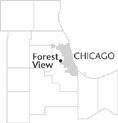| Entries |
| F |
|
Forest View, IL
|
 Cook County, 9 miles SW of the Loop. Originally conceived by attorney Joseph Nosek as a haven for
World War I
veterans, the village of Forest View received its name for the view of the
forest preserves
just west of the incorporated area across Harlem Avenue. In the mid-1920s Nosek and others were forced to leave town by gangster Ralph Capone, and Forest View soon earned the nickname “Caponeville.” Capone founded the Maple Inn, an infamous house of
prostitution.
Cook County, 9 miles SW of the Loop. Originally conceived by attorney Joseph Nosek as a haven for
World War I
veterans, the village of Forest View received its name for the view of the
forest preserves
just west of the incorporated area across Harlem Avenue. In the mid-1920s Nosek and others were forced to leave town by gangster Ralph Capone, and Forest View soon earned the nickname “Caponeville.” Capone founded the Maple Inn, an infamous house of
prostitution.
After Capone's influence waned, the effects of the Great Depression prevented Forest View from developing. Growth came in 1949 when Commonwealth Edison built a huge generating plant. Revenues from the plant gave the town a new lease on life, and the annexation of industrial land (part of the Clearing Industrial District) fueled further development after 1952. The village expanded from 50 homes to more than 250, and the proliferation of industry led some to refer to it as the trucking capital of the world.
The 2000 population stood at 778. Most people trace their ancestry to Polish, Czech, or German roots. Roughly 10 percent of the village's one square mile is residential; the 2-by-8-block residential area is a tiny oasis in the midst of industry.
| Forest View, IL (inc. 1924) | |||||
| Year |
Total
(and by category) |
Foreign Born | Native with foreign parentage | Males per 100 females | |
| 1930 | 125 | — | — | — | |
| 1960 | 1,042 | — | — | 101 | |
| 1,042 | White (100.0%) | ||||
| 1990 | 743 | 3.6% | — | 88 | |
| 724 | White (97.4%) | ||||
| 2 | Asian/Pacific Islander (0.3%) | ||||
| 10 | Other race (1.3%) | ||||
| 33 | Hispanic Origin* (4.4%) | ||||
| 2000 | 778 | 5.1% | — | 100 | |
| 723 | White alone (92.9%) | ||||
| 3 | Black or African American alone (0.4%) | ||||
| 37 | Some other race alone (4.8%) | ||||
| 15 | Two or more races (1.9%) | ||||
| 81 | Hispanic or Latino* (10.4%) | ||||
The Encyclopedia of Chicago © 2004 The Newberry Library. All Rights Reserved. Portions are copyrighted by other institutions and individuals. Additional information on copyright and permissions.